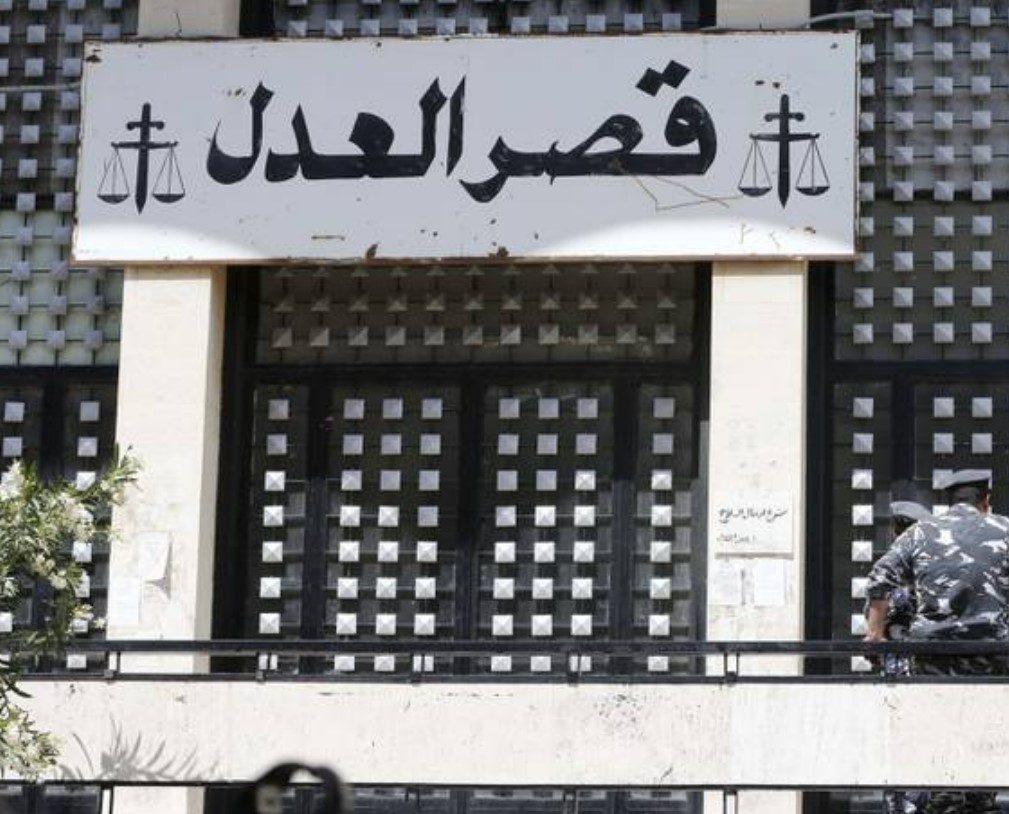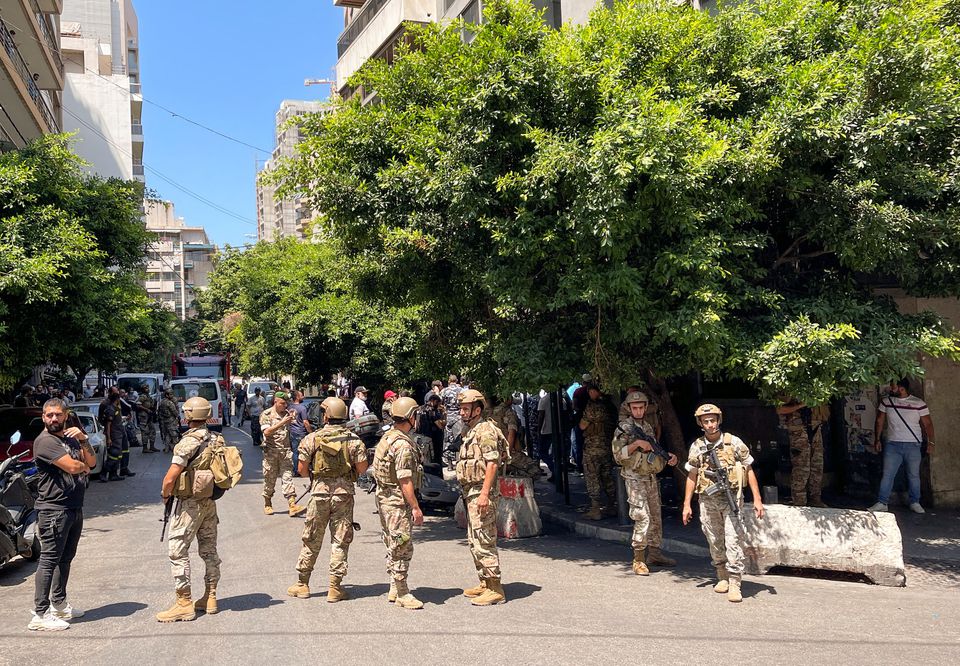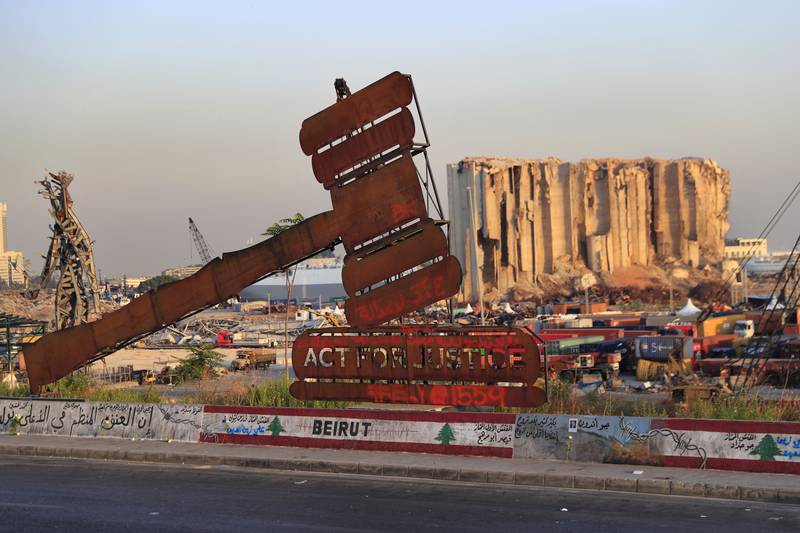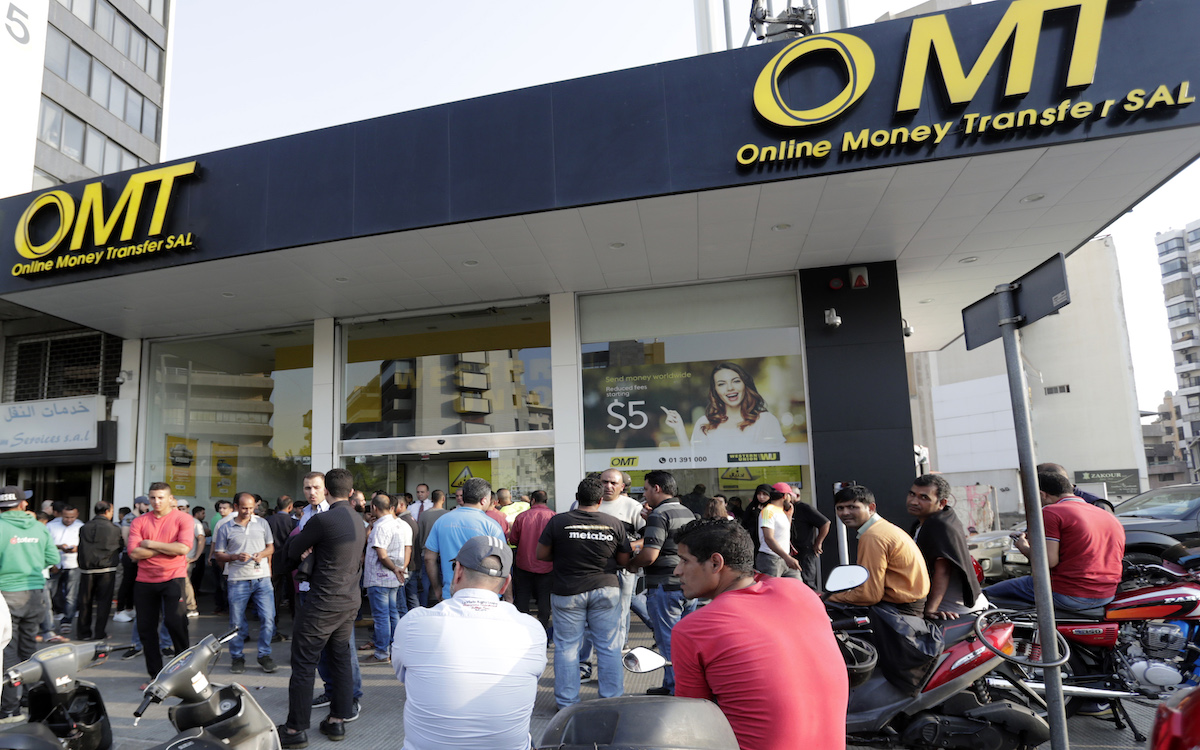by arabnews.com — DUBAI: Lebanese filmmaker and actress Nadine Labaki has been announced as a jury member for the 80th Venice International Film Festival, to take place from Aug. 30 to Sept. 9. She will be joined by French Cesar-winning actor and producer Elsa Zylberstein, Mexican actor and Oscar nominee Yalitza Aparicio, British-Nigerian screenwriter Misan […]

BY MENELAOS HADJICOSTIS AND ABBY SEWELL NICOSIA, Cyprus (AP) — The United Nations refugee agency said Friday it was “extremely concerned” over the return of more than 100 Syrian nationals from Cyprus to Lebanon without being screened to determine whether they need legal protection and who may be deported back to their war-wracked homeland. The UNHCR office in Cyprus said deportations and transfers between states “without legal and procedural safeguards for persons who may be in need of international protection” are against international and European law. Such transfers could result in people sent back to a country where “they may face the risk of persecution, torture, cruel, inhuman or degrading treatment or punishment and other irreparable harm,” the agency told the Associated Press. The Cyprus government said such returns are being lawfully carried out in line with a bilateral agreement the island nation and neighboring Lebanon signed in 2004.
According to senior Interior Ministry official Loizos Hadjivasiliou, the agreement obligates Lebanon to prevent and stop illegal border crossings and illegal migration of individuals who depart from Lebanon. Hadjivasiliou told the Associated Press these individuals are returned to Lebanon, which is deemed safe and where they enjoy benefits afforded to the hundreds of thousands of refugees in the country. “Under these circumstances, we believe that they don’t face any danger and their choice to set sail toward a European Union member country is being made for clearly economic reasons.”

by Mohammed Tawfeeq, CNN — Authorities in Lebanon moved to ban the “Barbie” movie from cinemas on Wednesday, saying it promotes homosexuality and violates the nation’s values. Culture Minister Mohammad Mortada banned the film from cinemas after delaying its release date to late August, saying it contradicts the “moral and religious values as well as the principles of Lebanon,” state-run media reported Wednesday. The minister said the movie also “promotes sexual deviance and transsexuality,” by Lebanese state-run media on Wednesday. “Sexual deviance” is a term commonly used in the Middle East to refer to homosexuals. The ban comes amid heightened anti-LGBTQ rhetoric by some politicians and government officials in Lebanon and the wider Middle East.
How Barbie made a surprising comeback Hassan Nasrallah, the leader of Lebanon’s Shiite Islamist Hezbollah movement, launched a tirade against homosexuals in late July during a speech marking Ashura, which commemorates the killing of the Hussain bin Ali, Prophet Mohammed’s grandson, in the 7th century. He referred to homosexuality as “sexual perversion” and identified same-sex relations as a “threat” to Lebanon. Days earlier, Nasrallah threatened the LGBTQ community in a video message, encouraging the use of derogatory terms and for them to be punished.

By Najia Houssari — arabnews.com — BEIRUT: At least two people were killed on Wednesday in clashes between armed Hezbollah fighters and Christian residents of Kahale, after a militia truck overturned on the road between Damascus and Beirut. Shots were fired after Hezbollah operatives who were escorting the vehicle surrounded the truck, which crashed on a downhill turn near Kahaleh, about 15km from the Lebanese capital. Security sources said one of the dead was a Hezbollah member and the other was villager Fadi Bejjani, 60. TV footage showed men in plainclothes firing rifles in the street. A third person was reportedly injured in the shootout, and bullets damaged nearby buildings.
Lebanese army troops were deployed around the lorry at nightfall while a crane was used to remove wooden crates from it. Witnesses said the boxes appeared to be ammunition crates, but there was no official confirmation. The truck was plain white in color with no military markings. Hezbollah later confirmed the truck belonged to them and one of their members had been killed while securing it. Church bells rang in the village to call people to gather. There were confrontations between villagers and the army as soldiers tried to prevent civilians from approaching the truck. The vehicle overturned at a notorious accident spot on the treacherous, winding road, which has many dangerous curves. Witnesses said the driver was injured when it overturned and fled the scene. A village spokesperson said they would not allow the vehicle to be moved, and urged “the Lebanese state to carry out its duties.” He added: “The army personnel who are present do nothing.”

by Dario Sabaghi — newarab.com — The Palestinian refugee camp of Ain al-Hilweh in Sidon, Lebanon, became the centre of intense fighting between rival armed groups last week. Between 29 July and 2 August, explosions, rockets, and gunshots shook the camp, resulting in at least 12 deaths, dozens of injuries, and the displacement of 2,000 people. The camp, housing nearly 50,000 registered Palestinian refugees, is now under a fragile ceasefire. The clashes reportedly started with an unsuccessful attempt to assassinate Islamist militant Mahmoud Khalil, nicknamed Abu Qatada, resulting in the death of one of his associates by a Fatah-affiliated gunman named Muhammad Zubaidat. Later, Islamist militants ambushed and killed Abu Ahmed al-Armoushi, a Palestinian security official linked to Fatah, along with his three associates. Full-blown fighting then erupted across the camp. “Between 29 July and 2 August, explosions, rockets, and gunshots shook the camp, resulting in at least 12 deaths, dozens of injuries, and the displacement of 2,000 people” A preliminary ceasefire was established on 2 August. However, clashes resumed later that evening, prompting a renewed, although fragile, ceasefire a day later.
Numerous political figures have called for calm, including Lebanon’s caretaker Prime Minister Najib Mikati, Palestinian Authority President and Fatah leader Mahmoud Abbas, Shia political party Hezbollah, Iran, and Hamas. Meanwhile, representative committees of the political factions are mediating to enforce the ceasefire. To grasp the extensive involvement of both domestic and foreign actors in managing the infighting, and the reasons behind the violence, it’s essential to understand what the Ain al-Hilweh camp is and why it is important. Located near Sidon, a coastal city 44 km south of Beirut, Ain al-Hilweh is the largest among Lebanon’s 12 Palestinian refugee camps. The camp is enclosed by a wall with guarded entrances and checkpoints monitored by the Lebanese Army. The 1969 Cairo Accord prohibits the army from entering the camp, a provision still in technical effect despite its annulment by Lebanon in 1987. This explains why Lebanon’s Army didn’t intervene and halt the hostilities. While the camp remains under Lebanon’s sovereignty, its practical governance lies with Palestinians. This means that security and administration within the camp fall under the jurisdiction of popular committees and Palestinian factions and it serves as a hub for numerous rival armed groups.
‘
by Jeff Wong, EY — Kristin Gilkes, EY — venturebeat — The recent Ant-Man movie did a great job of putting quantum up in lights, but the future of quantum science shines even brighter than fiction. One application, quantum sensors, is already the basis of some of the most important systems and technologies in our world — global positioning systems (GPS) and magnetic resonance imaging (MRI) scanners are prime examples. Quantum sensors and quantum AI are just the beginning: Robots are now getting the quantum sensor treatment too. Quantum sensors will supercharge the way robots work and how we apply them to important 21st-century challenges.
Why quantum sensors are a big deal
Modern technology is full of sensors that measure heat, light, movement, pressure or other aspects of the physical environment. Quantum sensors add something new. They use the quantum properties of how particles behave at atomic scale to detect tiny movements or changes in gravitational, electric or magnetic fields. Because they work at such a small scale, quantum sensors can measure light or other observable phenomena extremely accurately. It also means they can provide a highly precise and stable measurement, as they measure properties like the structure of atoms or spins of atomic particles, which never change. This accuracy and reliability make quantum sensors very useful. They make sure the tick of atomic clocks stays true to the beat of time, a quality which puts them at the heart of GPS and other Positioning, Navigation and Timing (PNT) systems. They are also widely used in MRI scanners to provide clinicians with finely detailed diagnostic images. And they are also helping improve the environmental data available to scientists and industry, a vital aspect of global sustainability efforts.
It’s important to mention, though, that sometimes being so precise and sensitive can be less useful. That’s because it results in a lot of noise in the data. Noisy data is a challenge that teams like our EY quantum data science team are tackling by implementing AI to separate insights from the noise. In fact, combining quantum sensing with other technologies is a strategy with lots of potential. Quantum sensing and robotics is a good example. The tiny size of most quantum sensors, plus their high sensitivity, have already led to their use as tactile sensing elements in fiber optic cables for robotic arms — helping the robot arm to perceive its environment by detecting precise information about pressure, vibration, temperature or texture. Other potential applications of this powerful combination are also emerging. For example, we are starting to see quantum sensors combined with mobile robots. Information about the environment detected by the sensors, such as small changes in temperature or magnetic fields, can enable the robot to make more precise movements and decisions, as well as gather valuable data for other purposes.

Story by Eleanor Pringle — Fortune.com — Experts often use an analogy of a toddler to describe A.I., suggesting products like chatbot phenomenon ChatGPT need to be taught everything they know by a real human being. In their early days, large language models (LLMs) like these are created by developers and programmers who build them up to a useable level. Then comes the point in an A.I.’s lifespan where it needs to learn how to communicate clearly and efficiently. This is where a new breed of technology employees is being created—and they don’t need to know a thing about coding. They are the ‘prompt engineers’, tasked with training LLMs to continuously give users accurate and useful responses.
Despite people in the role raking in six-figure salaries, potential employers often welcome candidates who don’t come from a tech background or have any coding skills. As Tesla’s former head of A.I. Andrei Kaparthy put it: “The hottest new programming language is English.” The shift in the tech careers landscape comes amid a heated race for the top spot in the A.I. market, which intensified in recent months after OpenAI’s ChatGPT was labeled a game changer. Google moved to launch Bard, its chatbot competitor, soon after Microsoft revealed Bing was being revamped to incorporate ChatGPT, in which the tech giant is investing $10 billion. Tesla has joined the race with its ‘Tesla Bot’, and Chinese search engine giant Baidu is developing its own version called Ernie Bot. Prompt engineer postings at the time of writing range from contracted remote work for $200 an hour, up to full-time positions paying up to $335,000.
One role, advertised by San Francisco-based A.I. research and safety organization Anthropic, asks for basic programming skills. However, the company emphasized in its job ad that it encourages people to apply “even if [they] do not believe [they] meet every single qualification.” “We think A.I. systems like the ones we’re building have enormous social and ethical implications,” the company says. “This makes representation even more important, and we strive to include a range of diverse perspectives on our team.”

By Zena Wakim, International lawyer, President of the Board, Accountability Now — euronews.com — The opinions expressed in this article are those of the author and do not represent in any way the editorial position of Euronews.
It is a humanitarian duty for the Council of the European Union to support the people of Lebanon and issue targeted sanctions against those who continue to promote their own interests to the detriment of the population, Zena Wakim writes. Beirut’s celebrated nightlife has long had a rebellious air: a subversive challenge to conservative dogma, an antidote to rotten politics and a hedonistic emancipation from sectarian street battles. But now even the night has been stolen, increasingly affordable only to the rich. Rolling power outages ensure that the city is bathed in darkness. Meanwhile, the tourism ministry excitedly predicted 2.2 million visitors this summer. Most will be Lebanese who long since fled, briefly seeing family and friends still trapped in a quagmire.
In Lebanon, it is difficult to know what rock bottom is, perhaps that’s why EU policymakers fail to treat it as a priority. Fifteen years of civil war, an Israeli invasion, a Syrian occupation, over 250 unsolved political assassinations, an unparalleled refugee crisis, the world’s worst economic collapse since the 19th century and one of the biggest non-nuclear explosions in history. The country is an unaccountable mafia state where over 80% of the citizens now live in multidimensional poverty and where ex-warlords turned politicians turned the state into a host they could feed on. Or, to quote the World Bank, the government has “consistently and acutely departed from orderly and disciplined fiscal policy to serve the larger purpose of cementing political economy interests.”
Dystopian scenes and parallel realities
By Melissa Cantor, Editor at LinkedIn News — North American banks appear eager to develop and deploy artificial intelligence in pursuit of a competitive edge. In 2022, U.S. and Canadian banks published 80% of the research and funded 60% of investments into AI applications for the financial services sector, Axios reports. The payoff could be […]

By Hassan Rahmeh — middleeastmonitor — – On the brink of socio-economic collapse, Lebanon finds itself caught in a relentless and unforgiving cycle that threatens its very foundation. The heart of this vexing challenge lies in a vicious loop where the government struggles with providing essential services, while citizens withhold their tax payments demanding more in return. This deeply entrenched culture has pushed the nation into an enduring swamp, where tax evasion and inadequate public services intertwine as stubborn adversaries. As Lebanon faces this perpetual challenge, a closer examination reveals a web of complexities, unearthing several other systemic factors that compound the crisis. Amidst the prevailing mistrust and the unsettling unfairness of the tax system, additional challenges have emerged, painting a comprehensive portrait of the nation’s plight.
This impasse was brought on by the widespread mistrust that the Lebanese people have in their own leadership. People have the impression that their taxes are being stolen and not used for the provision of public services. People’s perceptions of ineptitude and corruption inside the tax system foster mistrust, which in turn makes them reluctant to pay their taxes. Injustice within the tax system is the primary concern. Taxpayers experience feelings of injustice and misery and many people question the usefulness of contributing money to a system that appears to disregard their current financial situation. It’s a system that applies uniform taxes, regardless of wealth disparity. This resonates with many, fueling reluctance to contribute to a system seen as unjust. This perception of inequity sows seeds of doubt. It encourages non-compliance and fosters resentment toward the government. This further perpetuates the tax evasion culture prevalent in Lebanon.



